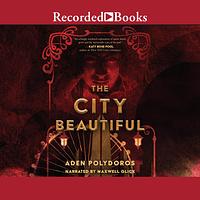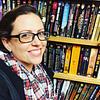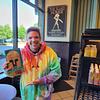Take a photo of a barcode or cover
https://wordnerdy.blogspot.com/2021/10/2021-book-200.html
This book should have been my catnip—queer, historical, VERY Jewish fantasy? I mean, yes please! But it didn’t totally work for me. Maybe because it’s a lot darker than I usually go for—I’m fine with dybbuks, but serial killers and serial child rapists are not fun to read about. I also did not enjoy reading the several lengthy anti-Semitic speeches where villains talked about how Jews are vermin. So content warnings all around, I guess. Anyway, this is the story of young Alter Rosen, whose father died on the way to American (1890s Chicago, to be precise) and now he is struggling to get enough money together to bring his mother and little sisters over. And then his friend (and crush) is murdered, and weird stuff starts happening, and a cocky thief from his past turns up…. Parts of this are a little slow, parts are kinda upsetting. I was one hundred percent here for loud socialist downstairs neighbor Raizel, a wannabe journalist. It was interesting to see which Jewish phrases/concepts were specifically defined and which were left to context (or I’m just a nerd about these things). I wanted to love this, and did love how rooted in Jewish history it is, but it was just a little too dark for my tastes. B+.
__
A review copy was provided by the publisher. This book will be released on Tuesday.
This book should have been my catnip—queer, historical, VERY Jewish fantasy? I mean, yes please! But it didn’t totally work for me. Maybe because it’s a lot darker than I usually go for—I’m fine with dybbuks, but serial killers and serial child rapists are not fun to read about. I also did not enjoy reading the several lengthy anti-Semitic speeches where villains talked about how Jews are vermin. So content warnings all around, I guess. Anyway, this is the story of young Alter Rosen, whose father died on the way to American (1890s Chicago, to be precise) and now he is struggling to get enough money together to bring his mother and little sisters over. And then his friend (and crush) is murdered, and weird stuff starts happening, and a cocky thief from his past turns up…. Parts of this are a little slow, parts are kinda upsetting. I was one hundred percent here for loud socialist downstairs neighbor Raizel, a wannabe journalist. It was interesting to see which Jewish phrases/concepts were specifically defined and which were left to context (or I’m just a nerd about these things). I wanted to love this, and did love how rooted in Jewish history it is, but it was just a little too dark for my tastes. B+.
__
A review copy was provided by the publisher. This book will be released on Tuesday.
challenging
dark
emotional
hopeful
mysterious
sad
tense
fast-paced
Plot or Character Driven:
Plot
Strong character development:
Yes
Loveable characters:
Yes
Diverse cast of characters:
Yes
Flaws of characters a main focus:
Yes
This is a compelling, haunting, fast-paced tale with a queer Jewish narrator. The place (late 1800s Chicago) sets the scene for theming around assimilation, injustice, community/belonging, and resilience.
At its heart, this is a story of oppressed folks on the outskirts of society reclaiming their power. It's a story of justice and a story of vengeance. It's sinister and paranormal (our main character is possessed by a dybbuk) and mysterious .. but also charming and filled with love and a deep appreciation for Jewish culture.
It was so exciting to see Jewish representation and culture and Yiddish & Hebrew language deeply woven into a story (that is not centered around the Holocaust). Yes, this book was DARK. But there was such comfort (for me) in reading about Jewish customs. I also liked how words & phrases were naturally included within the text (with a separate glossary at the end for those who are unfamiliar). I much prefer this versus over-explaining every term for goyim.
I wanted WAY more Raizel. Please! She was fascinating & I loved the inclusion of the anarchy plotline.
CW (there are lots): anti-semitism (explicit & in many forms), violence, murder/death, homophobia, sexual assault, rape, pedophilia, fire & fire injury, slurs, xenophobia, grief, animal cruelty & death (slaughterhouse scenes)
At its heart, this is a story of oppressed folks on the outskirts of society reclaiming their power. It's a story of justice and a story of vengeance. It's sinister and paranormal (our main character is possessed by a dybbuk) and mysterious .. but also charming and filled with love and a deep appreciation for Jewish culture.
It was so exciting to see Jewish representation and culture and Yiddish & Hebrew language deeply woven into a story (that is not centered around the Holocaust). Yes, this book was DARK. But there was such comfort (for me) in reading about Jewish customs. I also liked how words & phrases were naturally included within the text (with a separate glossary at the end for those who are unfamiliar). I much prefer this versus over-explaining every term for goyim.
I wanted WAY more Raizel. Please! She was fascinating & I loved the inclusion of the anarchy plotline.
CW (there are lots): anti-semitism (explicit & in many forms), violence, murder/death, homophobia, sexual assault, rape, pedophilia, fire & fire injury, slurs, xenophobia, grief, animal cruelty & death (slaughterhouse scenes)
The City Beautiful, by Aden Polydoros, is a queer, Jewish historical fantasy. In this world, the question isn’t about whether dybbuks are real, but how to handle dybbuk possession.
It’s Chicago in 1983, right at the World’s Fair, and Alter Rosen is working hard and saving his money to bring his mother and little sisters from Romania to join him. He works long hours, shares a room with other boys in the same situation, dodges the nosy matchmaker across the hall, etc., sharing a lifestyle that’s very familiar from Jewish-American fiction. The whole thing has plenty of Yiddish insults and jokes too. I think the horrors and supernatural aspects of the novel worked so well for me because the setting felt familiar and realistic.
In the weeks leading up to the World’s Fair, Jewish teenage boys are somehow disappearing from Chicago’s streets. The local police claim the young men must have run away, and with no bodies or evidence of the missing boys, it’s hard for the families to contest that, even when they’re absolutely sure their son or their friend didn’t just take off. This is just background as Yakov works and saves, and tries to keep a certain secret that dare not speak its name. But when Yakov — Alter’s friend, roommate, and maybe more — disappears one night, Alter is pulled into the mystery.
The City Beautiful is a supernatural mystery involving very real criminals plus intense magical elements from Jewish lore. Yakov’s spirit is intent on getting revenge for his murder, but this takes the form of an angry dybbuk who may take Alter down with him in the process, creating serious tension as Alter tries to unravel Yakov’s last days, before supernatural terrors and regular enemies come for him.
The investigation leads to basically everything Alter doesn’t want to think about, personally and socially. He has a wonderfully complicated motivation throughout most of the book. I was never quite sure how much was powered by his affection for Yakov and desire to see justice for someone he loved, and how much was the terrifying dybbuk possession, and it sort of doesn’t matter. There is never any question in this world that dybbuks are real (along with certain other supernatural abilities and dangers brought over from the old country), so we don’t waste any narrative time making excuses or trying to think up other explanations.
Without revealing too much, the investigation points to many forms of social inequality. Some of this is direct, with competing Yiddish newspapers directly discussing Jewish immigrant life. But some are more subtle. Who is important enough to get police protection? Who is too powerful to be questioned by the police? Which immigrants have good English, and which ones have to obfuscate their home countries? Alter is a good narrator of this, because it’s all just background to him as he copes with his personal events and memories.
This is a beautiful story in a dangerous and dark world, but powered by friendship and justice. And The City Beautiful is also a queer love story, with believable, complicated affection. (I don’t want to give spoilers, because I want you to read this one yourself, but I have to say that I do really enjoy finding stories where a girl and a boy can just learn to like and respect each other without that growing compassion automatically becoming a romantic plot.)
It’s Chicago in 1983, right at the World’s Fair, and Alter Rosen is working hard and saving his money to bring his mother and little sisters from Romania to join him. He works long hours, shares a room with other boys in the same situation, dodges the nosy matchmaker across the hall, etc., sharing a lifestyle that’s very familiar from Jewish-American fiction. The whole thing has plenty of Yiddish insults and jokes too. I think the horrors and supernatural aspects of the novel worked so well for me because the setting felt familiar and realistic.
In the weeks leading up to the World’s Fair, Jewish teenage boys are somehow disappearing from Chicago’s streets. The local police claim the young men must have run away, and with no bodies or evidence of the missing boys, it’s hard for the families to contest that, even when they’re absolutely sure their son or their friend didn’t just take off. This is just background as Yakov works and saves, and tries to keep a certain secret that dare not speak its name. But when Yakov — Alter’s friend, roommate, and maybe more — disappears one night, Alter is pulled into the mystery.
The City Beautiful is a supernatural mystery involving very real criminals plus intense magical elements from Jewish lore. Yakov’s spirit is intent on getting revenge for his murder, but this takes the form of an angry dybbuk who may take Alter down with him in the process, creating serious tension as Alter tries to unravel Yakov’s last days, before supernatural terrors and regular enemies come for him.
The investigation leads to basically everything Alter doesn’t want to think about, personally and socially. He has a wonderfully complicated motivation throughout most of the book. I was never quite sure how much was powered by his affection for Yakov and desire to see justice for someone he loved, and how much was the terrifying dybbuk possession, and it sort of doesn’t matter. There is never any question in this world that dybbuks are real (along with certain other supernatural abilities and dangers brought over from the old country), so we don’t waste any narrative time making excuses or trying to think up other explanations.
Without revealing too much, the investigation points to many forms of social inequality. Some of this is direct, with competing Yiddish newspapers directly discussing Jewish immigrant life. But some are more subtle. Who is important enough to get police protection? Who is too powerful to be questioned by the police? Which immigrants have good English, and which ones have to obfuscate their home countries? Alter is a good narrator of this, because it’s all just background to him as he copes with his personal events and memories.
This is a beautiful story in a dangerous and dark world, but powered by friendship and justice. And The City Beautiful is also a queer love story, with believable, complicated affection. (I don’t want to give spoilers, because I want you to read this one yourself, but I have to say that I do really enjoy finding stories where a girl and a boy can just learn to like and respect each other without that growing compassion automatically becoming a romantic plot.)
adventurous
dark
emotional
mysterious
sad
tense
fast-paced
Plot or Character Driven:
A mix
Strong character development:
Yes
Loveable characters:
Yes
Diverse cast of characters:
Complicated
Flaws of characters a main focus:
Yes
A really interesting and unique story. Only issue is that character relationships are all pretty underdeveloped. The beginning was also pretty slow, but I didn’t mind since the writing is good.
What a thrilling ride!
Polydoros has crafted a novel with mystery, mythos and, most of all, heart. Written with care and attention to detail, the characters felt real and their relationships were beautifully developed. Touching on subjects such as: racism, discrimination and queer identities, this book expertly weaves all of those themes together, in an exciting story.
I will definitely keep an eye out for anything Polydoros writes from here on out!
Polydoros has crafted a novel with mystery, mythos and, most of all, heart. Written with care and attention to detail, the characters felt real and their relationships were beautifully developed. Touching on subjects such as: racism, discrimination and queer identities, this book expertly weaves all of those themes together, in an exciting story.
I will definitely keep an eye out for anything Polydoros writes from here on out!
dark
emotional
mysterious
tense
medium-paced
Plot or Character Driven:
A mix
Strong character development:
Yes
Loveable characters:
Yes
Diverse cast of characters:
Yes
Flaws of characters a main focus:
Complicated
dark
emotional
medium-paced
Plot or Character Driven:
A mix
Strong character development:
Complicated
Loveable characters:
Complicated
Diverse cast of characters:
Yes
Flaws of characters a main focus:
Yes
At some points I really enjoyed this book. At others, it was kinda meh. But I did like it and I'm glad it's out there! We need more Jewish books that aren't about the Holocaust. There are other interesting times in Jewish history.
Graphic: Death, Hate crime, Homophobia, Antisemitism, Grief, Murder, Sexual harassment
Moderate: Sexual assault
adventurous
challenging
mysterious
medium-paced
dark
mysterious
tense
medium-paced
Plot or Character Driven:
A mix
Strong character development:
Yes
Loveable characters:
Yes
Diverse cast of characters:
Yes
Flaws of characters a main focus:
Yes









